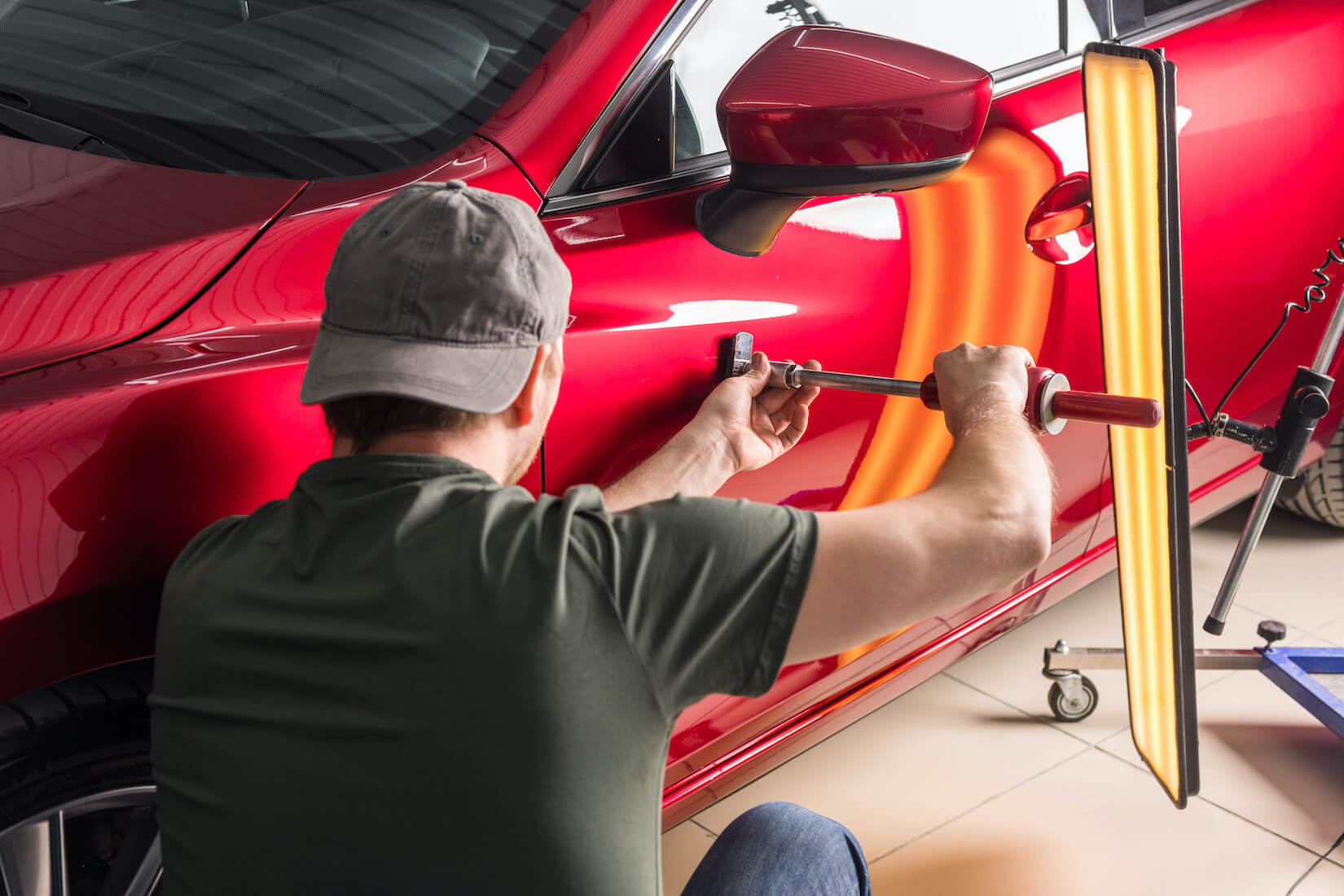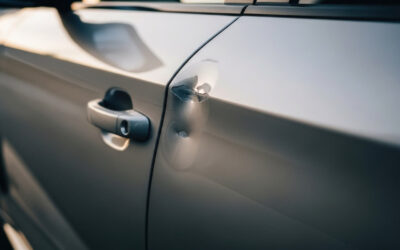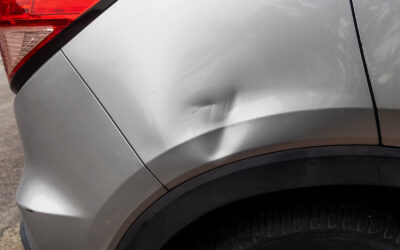You don’t have to look hard to spot it — a small dent that seems to appear overnight. Maybe it happened in a parking lot in Lakewood, or during one of those quick hailstorms that sweep through Arvada and Littleton each spring. That’s life in Colorado and other states along Hail Alley, where shifting mountain weather keeps body shops busy year-round.
Both paintless dent repair (PDR) and traditional dent repair can restore your car’s finish, but they work in very different ways — and choosing the right one can save you time, money, and your factory paint job. If you’re looking for paintless dent repair in Denver, for example, understanding how PDR compares to traditional bodywork will help you make the right choice before scheduling your repair.
In this article, we’ll examine the key differences between these two repair options, explain how each process works, and discuss how to decide which approach makes the most sense for your vehicle.
Who Needs Paintless Dent Repair or Traditional Dent Repair
Do you have dents on your car and aren’t sure what to do next? You’re not alone. This article is for:
- Drivers across Colorado who’ve discovered a new dent after a hailstorm or a parking lot mishap.
- Car owners comparing repair quotes and wondering why one shop recommends paintless dent repair while another suggests traditional bodywork.
- People filing insurance claims who want to understand which method their policy might cover.
- Anyone new to dent repair who wants to make the best choice for their vehicle’s condition, age, and value.
If that sounds like you, read on. Understanding the differences between these two repair methods will help you make a confident, informed decision before you book your repair.
What Is Paintless Dent Repair?
Paintless dent repair (PDR) is a specialized technique to remove minor dents and dings without sanding, filling, or repainting. It restores your vehicle’s original shape by gently reshaping the metal from behind the panel, keeping the factory paint intact and the repair virtually invisible.
How Paintless Dent Repair Works
Technicians use precision tools to reach behind the dented area and massage the metal back to its original contour. PDR leaves the factory finish untouched because there’s no need for paint or filler. It’s quick, clean, and perfect for more minor dents caused by hail, door dings, or minor impacts.
When to Choose Paintless Dent Repair
Paintless dent repair is ideal when the paint surface is still intact — such as with hail damage, minor creases, or light door dings. It’s beneficial for newer vehicles where preserving the original paint helps maintain resale value. If the paint is cracked or the dent is deep, though, PDR may not be the right fit.
Pros and Cons of Paintless Dent Repair
It stands to reason that anyone with hail damage to their vehicle wants to get it fixed with PDR methods — it’s faster, more affordable, and environmentally friendly — and most attractive is that repairs don’t include a paint booth. Repairs are often completed in a day and approved by most insurance companies for hail damage claims. The only drawback is that it’s limited to dents with unbroken paint or mild metal distortion.
For most minor dents and hail damage, paintless dent repair offers a fast, affordable way to restore your car without compromising the original finish. It’s the go-to choice for drivers who want professional results with minimal downtime.
What Is Traditional Dent Repair?
Traditional dent repair is a more hands-on, paint-based method to fix deeper dents, cracks, or collision damage. Unlike PDR, this process involves sanding, filling, priming, and repainting the affected area to rebuild the surface and completely match the surrounding paint.
How Traditional Dent Repair Works
A technician sands down the damaged area, reshapes the metal, and applies a body filler to even out imperfections. Once smooth, the panel is primed, repainted, and sealed with a clear coat before polishing. This method takes longer than PDR but allows for a complete cosmetic restoration — even when the paint is chipped or the metal is severely distorted.
When to Choose Traditional Dent Repair
In one crucial way, traditional repair or PDR often comes down to the paint. PDR won’t be enough if the dent has cracked the paint, stretched the metal, or caused significant creasing. Traditional paint repair is needed when the original paint on your car has been damaged. Traditional paint repairs are ideal for older vehicles with faded or previous bodywork.
Pros and Cons of Traditional Dent Repair
Traditional dent repair can fix almost any damage. The trade-off, though, is time and cost. Traditional repairs require more labor, materials, and paint blending in the booth, and can take a week or more to complete. But, for significant damage, such as deep dents from large hailstones or long, nasty creases from a fallen tree, it’s the most reliable way to restore your car’s appearance and structural integrity.
Traditional repair may take longer and cost more, but it delivers a complete reset for vehicles with serious dents or paint damage. When precision and a flawless finish matter most, this method provides lasting results.
Quick Comparison Guide: PDR vs. Traditional Paint Repair
| Feature | Paintless Dent Repair (PDR) | Traditional Dent Repair |
| Method | Gently massages metal from behind the panel to remove dents without paint or filler. | Sands, fills, primes, and repaints the damaged area to rebuild the surface. |
| Paint / Finish | Keeps your original factory paint intact. | Requires new paint; color-matching may vary slightly. |
| Type of Damage | Best for minor dents, dings, and hail damage where the paint isn’t cracked. | Ideal for deep dents, sharp creases, or cracked and chipped paint. |
| Repair Time | Fast — often same day or within hours. | Slower — can take several days depending on paint and drying times. |
| Cost | Generally lower due to minimal labor and materials. | Higher because of paint, filler, and extended labor time. |
| Environmental Impact | Eco-friendly — no chemicals, fillers, or paint waste. | Less eco-friendly — uses paints and solvents. |
| Insurance Coverage | Commonly approved for hail and minor damage claims. | Also covered, especially for collision or major repairs. |
| Overall Advantage | Quick, affordable, and keeps the factory finish. | Complete restoration for severe or paint-damaged areas. |
Denver’s Trusted Hail Damage Repair Experts
Living in Colorado means getting used to hailstorms. After the skies clear, many car owners across Denver, Wheat Ridge, and Westminster wonder whether paintless or traditional dent repair is the best choice.
At Mile High Dents, we specialize in both. Our experienced technicians inspect every vehicle and recommend the right repair method for your situation — whether that means gently removing dents through PDR or restoring damaged panels with professional paintwork. You’ll get honest guidance, clear estimates, and repairs done right the first time.
If you’re unsure which option best suits your vehicle, call us at (720) 772-0133 or schedule a free inspection online. We’ll walk you through your options, help with insurance claims, and ensure your car looks its best again — no stress, no guesswork.
At Mile High Dents, we specialize in paintless dent repair (PDR) for all types of vehicles across the Denver metro area. Whether you’re dealing with hail damage, an annoying door ding, or a larger dent, our expert technicians restore your vehicle to like-new condition without repainting, sanding, or fillers.





